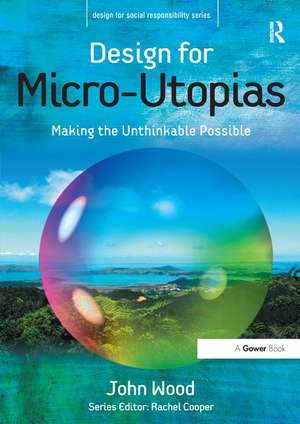Design for Micro-Utopias: Making the Unthinkable Possible: Design for Social Responsibility
Autor John Wooden Limba Engleză Paperback – 9 sep 2016
| Toate formatele și edițiile | Preț | Express |
|---|---|---|
| Paperback (1) | 386.77 lei 3-5 săpt. | +22.67 lei 7-13 zile |
| Taylor & Francis – 9 sep 2016 | 386.77 lei 3-5 săpt. | +22.67 lei 7-13 zile |
| Hardback (1) | 765.43 lei 6-8 săpt. | |
| Taylor & Francis – 21 dec 2007 | 765.43 lei 6-8 săpt. |
Preț: 386.77 lei
Nou
Puncte Express: 580
Preț estimativ în valută:
74.02€ • 76.81$ • 61.87£
74.02€ • 76.81$ • 61.87£
Carte disponibilă
Livrare economică 22 februarie-08 martie
Livrare express 08-14 februarie pentru 32.66 lei
Preluare comenzi: 021 569.72.76
Specificații
ISBN-13: 9781138252424
ISBN-10: 1138252425
Pagini: 226
Dimensiuni: 174 x 246 x 20 mm
Greutate: 0.45 kg
Ediția:1
Editura: Taylor & Francis
Colecția Routledge
Seria Design for Social Responsibility
Locul publicării:Oxford, United Kingdom
ISBN-10: 1138252425
Pagini: 226
Dimensiuni: 174 x 246 x 20 mm
Greutate: 0.45 kg
Ediția:1
Editura: Taylor & Francis
Colecția Routledge
Seria Design for Social Responsibility
Locul publicării:Oxford, United Kingdom
Cuprins
Contents: Introduction; Our dysfunctional world; The rise of solipsism; Bureaucracy; Academic rigour; Writing the design; Clocks beyond number; Thinking beyond the possible; Synergy; Metadesign; Towards an ethics of flow; Index.
Notă biografică
John Wood is Professor of Design and Coordinator of the MA Design Futures programme at Goldsmiths College, University of London. He has published many papers and articles on ethics and design and edited 'The Virtual Embodied' (Routledge, 1998). He is also co-founder of the Attainable Utopias network.
Recenzii
'Wood's timely intervention into the politics of sustainability is a breath of fresh air in the current rhetoric of fundamentalist clichés. His personal vision for long-term solutions to the pressing need for action, that centuries of opportunism and expediency now present us with, are original and insightful. This book's great virtue is that it is driven by an idealist passion that remains grounded in Wood's reflections on his experience of the 'every day'...Its final call for new categories and ideas, rather than reactive prohibitions, offers one of the few books on sustainability that does not leave the reader in a slough of dispair.' Michael Punt, Editor-In-Chief, Leonardo Reviews.
'That rare and invaluable commodity, a book that spells out the reality of our current global predicaments but gives room for optimism and a design plan for delivery. As a natural polymath, Professor Wood is one of the only people who could write such a visionary yet practical book.' Professor Martin Woolly, Director of Research, Central Saint Martins College of Art and Design, London.
'That rare and invaluable commodity, a book that spells out the reality of our current global predicaments but gives room for optimism and a design plan for delivery. As a natural polymath, Professor Wood is one of the only people who could write such a visionary yet practical book.' Professor Martin Woolly, Director of Research, Central Saint Martins College of Art and Design, London.
Descriere
Design for Micro-Utopias does not advocate a serious quest for a single, monolithic Utopia. Rather, it invites readers to embrace a more tentative, temporary, pluralized and truncated version of Thomas More's famous 1516 novel of the same name. It therefore encourages the proliferation of many 'micro-utopias' rather than one 'Utopia'. This requires a less critical, negative and rational approach. Referencing a wide range of philosophical thinking from Aristotle to the present day, western and eastern spiritual ideals, and scientific, biological and systems theory, John Wood offers remedies for our excessively individualistic, mechanistic and disconnected thinking, and asks whether a metadesign approach might bring about a new mode of governance. This is a daring idea. Ultimately, he reminds us that, if we believe that miracles are impossible, we make them even less attainable. The first step is to make them 'thinkable'.



































